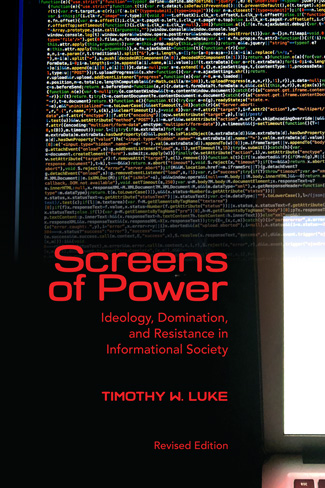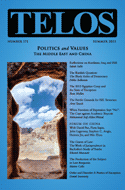By Collin May · Monday, January 15, 2024 Gabriel Noah Brahm’s interview with Collin May appears here.
 The rapid expansion of woke ideology and its attendant cancel culture has produced both a popular and an academic backlash. The recent appearance by the trio of university presidents before the House of Representatives Education Committee has only served to focus that backlash against the conformism and anti-free speech culture that dominate many university campuses. The rapid expansion of woke ideology and its attendant cancel culture has produced both a popular and an academic backlash. The recent appearance by the trio of university presidents before the House of Representatives Education Committee has only served to focus that backlash against the conformism and anti-free speech culture that dominate many university campuses.
On a popular level, we are all familiar with concepts such as anti-racism, settler colonialism, and the ubiquitous EDI—equity, diversity, and inclusion. On the intellectual level, the backlash focuses on a growing sense of scholarly puritanism attributed to anti-Enlightenment theories that underly these public concepts. The theories include: neo-feminism; postmodernism, often with a Foucauldian inspiration; and critical theory. As far as critical theory is concerned, the spotlight shines on German-American critical theorist Herbert Marcuse.
Marcuse is famous for an essay he wrote in 1965 entitled “Repressive Tolerance.” In it, he argued that tolerance in the liberal capitalist West was simply a veil that oppressive right-wing movements and state institutions used to dominate public discourse while silencing left-leaning activism. In response, Marcuse called for the outright suppression of speech and discourse deemed right-wing. In other words, intolerance for allegedly right-leaning narratives, with untrammeled promotion of the supposedly emancipatory left-leaning narratives.
Continue reading →
By Telos Press · Tuesday, January 12, 2021 In today’s episode of the Telos Press Podcast, Camelia Raghinaru talks with Justin Neville Kaushall about his article “Natural Spontaneity, or Adorno’s Aesthetic Category of the Shudder,” from Telos 192 (Fall 2020). An excerpt of the article appears here. If your university has an online subscription to Telos, you can read the full article at the Telos Online website. For non-subscribers, learn how your university can begin a subscription to Telos at our library recommendation page. Purchase a print copy of Telos 192 in our online store.
Listen to the podcast here.
Continue reading →
By Telos Press · Tuesday, December 1, 2020 Now available! Screens of Power: Ideology, Domination, and Resistance in Informational Society, by Timothy W. Luke. Purchase your copy in our online store and save 20% by using the coupon code BOOKS20 during checkout. Also available in Kindle ebook format at Amazon.com.
Screens of Power
Ideology, Domination, and Resistance in Informational Society
 by Timothy W. Luke by Timothy W. Luke
With a Foreword by Ronald J. Deibert
This new edition of Screens of Power: Ideology, Domination, and Resistance in Informational Society, first published in 1989, reintroduces the innovative critique of informational culture, politics, and society outlined by Timothy W. Luke in Telos and other publications during the late 1970s and early 1980s. Much has changed, but far more has stayed the same, making this new edition useful for many readers, as digital images ground personal identity, informatics is geopolitics, grand history endlessly reruns as televisually formatted ritual, electronic electioneering never ends, tele-traditional cultures spin up the spirit of tele-ethnicity in new social movements, and digital divides continue crashing against cybernetic exchange.
Continue reading →
By Telos Press · Monday, November 16, 2020 Now available for pre-order: Screens of Power: Ideology, Domination, and Resistance in Informational Society, by Timothy W. Luke. Pre-order today in our online store and save 30% off the list price. Release date: December 1, 2020. Also save 30% on Luke’s Anthropocene Alerts: Critical Theory of the Contemporary as Ecocritique and on A Journal of No Illusions: Telos, Paul Piccone, and the Americanization of Critical Theory, edited by Tim Luke and Ben Agger.
Screens of Power
Ideology, Domination, and Resistance in Informational Society
 by Timothy W. Luke by Timothy W. Luke
With a Foreword by Ronald J. Deibert
Release date: December 1, 2020
This new edition of Screens of Power: Ideology, Domination, and Resistance in Informational Society, first published in 1989, reintroduces the innovative critique of informational culture, politics, and society outlined by Timothy W. Luke in Telos and other publications during the late 1970s and early 1980s. Much has changed, but far more has stayed the same, making this new edition useful for many readers, as digital images ground personal identity, informatics is geopolitics, grand history endlessly reruns as televisually formatted ritual, electronic electioneering never ends, tele-traditional cultures spin up the spirit of tele-ethnicity in new social movements, and digital divides continue crashing against cybernetic exchange.
On now countless screens of power, which are embedded in billions of smartphones, taxi seats, elevator panels, automobile dashboards, refrigerator doors, airport walls, work cubicles, skyscraper displays, exercise machines, and home video centers, a mix of disinformative mystifications exploits with vivid images of violence the unprecedented inequalities and inequities expressed in America’s bitter racial, gender, ethnic, and class conflicts. Their impact is sparking widespread popular resistance because many citizens feel oligarchy and demagoguery in both political parties are eclipsing democracy and opportunity.
Continue reading →
By Telos Press · Monday, October 31, 2016 “The idea of a revolutionary, ‘post-materialistic’ subject, personified by marginal actors, was popularized by Jean-Paul Sartre, who viewed outcasts and criminals, like the writer and petty criminal Jean Genet, as enlightened critics of bourgeois society. In Germany, Frankfurt School theorists like Claus Offe proposed that in ‘late capitalism’ ever more social groups—the unemployed, the mentally ill, the lawbreakers—would be pushed to the margins and could eventually pose a real threat to the social order. The problem, as one wit put it, was that ‘late capitalism’ kept arriving too late.”
—Elliot Neaman, Free Radicals: Agitators, Hippies, Urban Guerrillas, and Germany’s Youth Revolt of the 1960s and 1970s
Continue reading →
By Matteo Calla · Thursday, July 30, 2015  This article places Benjamin’s late work in dialogue with recent attempts in media theory and structuralism to think the subject and historical contingency together. It argues their apparent incompatibility is reflected in Benjamin’s writing in the form of a recurrent contradiction between historical materialism and transhistorical theology. Through a reconstruction of the theorist’s historicization of an earlier theological theory of the fall of language in his Marxian-inflected work of the 1930’s, it claims that Benjamin initiates a historicist reconceptualization of the impasse of the Kantian subject onto being as the product of a particular field of mediation arising with mass modernity. Yet following the rejection of his nascent version of the Arcades Project by Adorno and the Marxist Institute for Social Research in 1938, theology returns as an attempt to reconceive of an aesthetic-formal break with this impasse. Benjamin’s late theorization of his materialist historiography thus represents a dialectical attempt to think materialism and theology, history and being together, with the aim of mediating not only distraction, but a revolutionary destruction of the subject and the historical order producing it. This article places Benjamin’s late work in dialogue with recent attempts in media theory and structuralism to think the subject and historical contingency together. It argues their apparent incompatibility is reflected in Benjamin’s writing in the form of a recurrent contradiction between historical materialism and transhistorical theology. Through a reconstruction of the theorist’s historicization of an earlier theological theory of the fall of language in his Marxian-inflected work of the 1930’s, it claims that Benjamin initiates a historicist reconceptualization of the impasse of the Kantian subject onto being as the product of a particular field of mediation arising with mass modernity. Yet following the rejection of his nascent version of the Arcades Project by Adorno and the Marxist Institute for Social Research in 1938, theology returns as an attempt to reconceive of an aesthetic-formal break with this impasse. Benjamin’s late theorization of his materialist historiography thus represents a dialectical attempt to think materialism and theology, history and being together, with the aim of mediating not only distraction, but a revolutionary destruction of the subject and the historical order producing it.
Continue reading →
|
|
 The rapid expansion of woke ideology and its attendant cancel culture has produced both a popular and an academic backlash. The recent appearance by the trio of university presidents before the House of Representatives Education Committee has only served to focus that backlash against the conformism and anti-free speech culture that dominate many university campuses.
The rapid expansion of woke ideology and its attendant cancel culture has produced both a popular and an academic backlash. The recent appearance by the trio of university presidents before the House of Representatives Education Committee has only served to focus that backlash against the conformism and anti-free speech culture that dominate many university campuses. 
 This article places Benjamin’s late work in dialogue with recent attempts in media theory and structuralism to think the subject and historical contingency together. It argues their apparent incompatibility is reflected in Benjamin’s writing in the form of a recurrent contradiction between historical materialism and transhistorical theology. Through a reconstruction of the theorist’s historicization of an earlier theological theory of the fall of language in his Marxian-inflected work of the 1930’s, it claims that Benjamin initiates a historicist reconceptualization of the impasse of the Kantian subject onto being as the product of a particular field of mediation arising with mass modernity. Yet following the rejection of his nascent version of the Arcades Project by Adorno and the Marxist Institute for Social Research in 1938, theology returns as an attempt to reconceive of an aesthetic-formal break with this impasse. Benjamin’s late theorization of his materialist historiography thus represents a dialectical attempt to think materialism and theology, history and being together, with the aim of mediating not only distraction, but a revolutionary destruction of the subject and the historical order producing it.
This article places Benjamin’s late work in dialogue with recent attempts in media theory and structuralism to think the subject and historical contingency together. It argues their apparent incompatibility is reflected in Benjamin’s writing in the form of a recurrent contradiction between historical materialism and transhistorical theology. Through a reconstruction of the theorist’s historicization of an earlier theological theory of the fall of language in his Marxian-inflected work of the 1930’s, it claims that Benjamin initiates a historicist reconceptualization of the impasse of the Kantian subject onto being as the product of a particular field of mediation arising with mass modernity. Yet following the rejection of his nascent version of the Arcades Project by Adorno and the Marxist Institute for Social Research in 1938, theology returns as an attempt to reconceive of an aesthetic-formal break with this impasse. Benjamin’s late theorization of his materialist historiography thus represents a dialectical attempt to think materialism and theology, history and being together, with the aim of mediating not only distraction, but a revolutionary destruction of the subject and the historical order producing it. 

